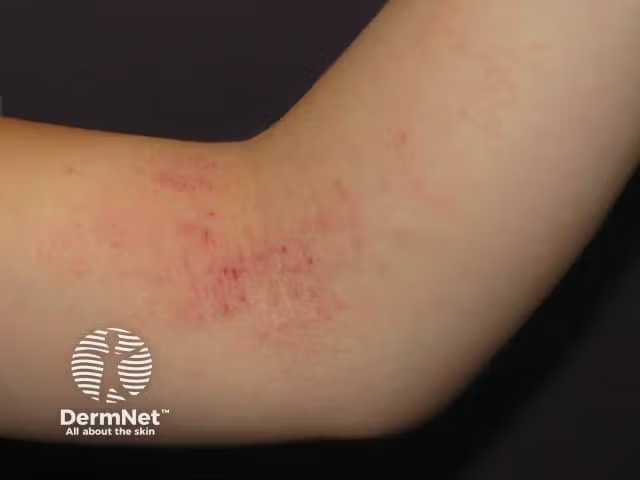- Case-Based Roundtable
- General Dermatology
- Eczema
- Chronic Hand Eczema
- Alopecia
- Aesthetics
- Vitiligo
- COVID-19
- Actinic Keratosis
- Precision Medicine and Biologics
- Rare Disease
- Wound Care
- Rosacea
- Psoriasis
- Psoriatic Arthritis
- Atopic Dermatitis
- Melasma
- NP and PA
- Skin Cancer
- Hidradenitis Suppurativa
- Drug Watch
- Pigmentary Disorders
- Acne
- Pediatric Dermatology
- Practice Management
- Prurigo Nodularis
- Buy-and-Bill
News
Article
Delphi Study Offers Insights on Food Allergy Testing in AD
Author(s):
Key Takeaways
- Up to 50% of children with AD show food sensitization, complicating management and leading to potential unnecessary dietary restrictions.
- FA testing in AD is inconsistent, with no universal guidelines, complicating interpretation and management of test results.
The study underscores the need for careful dietary advice to balance effective AD management and minimize food allergy risks.
Atopic dermatitis (AD) affects up to 20% of children globally, with most cases being mild to moderate and typically managed using emollients and topical corticosteroids (TCS). However, concerns about the safety and perceived ineffectiveness of these treatments often lead caregivers to explore alternative management strategies, including food allergy (FA) testing.1 A recent study delved into the relationship between AD and FA, current practices around FA testing, and findings from a recent Delphi consensus exercise involving UK clinicians.2
Association Between AD and FA
Researchers found a strong correlation between AD and food sensitization, with up to 50% of children with AD demonstrating sensitization to at least 1 food. Among infants aged 0 to 2 years, the prevalence of clinical FA reaches as high as 39.2%, particularly in those with early-onset or severe AD. The study stated this overlap drives many parents to restrict certain foods without professional guidance, potentially exacerbating the problem. “Excluding such foods, especially in infants with AD already sensitized to allergens, can lead to loss of tolerance with subsequent IgE-mediated FA on accidental re-exposure,” noted the authors, emphasizing the need for careful dietary decisions.
Current Challenges in FA Testing
The study stated that FA testing in the context of AD is often inconsistent and controversial. Tests are typically performed when immediate (IgE-mediated) or delayed (non-IgE) FA is suspected, especially in cases of severe AD or unclear symptom origins. However, researchers noted interpreting test results and their implications remains a significant challenge. Positive results on skin prick tests (SPT) or specific IgE tests do not always correlate with clinical FA, further complicating management.
Though clinicians are frequently tasked with advising parents on FA test results, there is no universal guideline. The authors noted that testing “should focus on confirming or refuting diagnoses following a detailed allergy-focused history,” while warning that inappropriate testing can sometimes detract from effective AD treatment with topical therapies.
Study Overview
To address these ambiguities, a Delphi consensus exercise was conducted involving allergists, dermatologists, dietitians, general practitioners, and pediatricians. The goal was to establish dietary advice guidelines for caregivers of children under 2 years of age with AD, based on SPT results for cow’s milk, hen’s egg, wheat, and soy, the most common allergens.The study consisted of 3 anonymous survey rounds and a final workshop, with high participation rates from the panelists.
Key Findings
The consensus yielded several important insights into the interpretation and application of food allergy testing in children with AD. The panel achieved agreement on defining skin prick test (SPT) results, identifying wheal sizes of 0 to 1 mm as negative and ≥5 mm as indicative of sensitization, though results in the 2 to 4 mm range remained inconclusive, reflecting the variability in clinical practice. A key outcome of the study was the development of a flowchart that outlines diagnostic pathways based on SPT results, recent food ingestion, and symptom presentation, offering clinicians a standardized approach to guide dietary recommendations. The panel also reached consensus on the use of commercial extracts for SPTs for wheat and soy, though there was no agreement on the optimal testing materials for cow’s milk and hen’s egg. Collectively, these findings aim to bridge gaps in evidence and standardize clinical decision-making, while acknowledging the nuances and uncertainties that remain in food allergy testing for children with AD.
Implications for Practice
The study offers practical guidance for clinicians managing children with AD and suspected FA. However, it also underscores the limitations of routine FA testing. They also warned against over-reliance on FA tests as they can distract from primary AD management, which involves consistent use of topical therapies.
The findings of the Delphi exercise contribute to the ongoing debate about the role of FA testing in AD management. As the Trial of Food Allergy IgE Tests for Eczema Relief (TIGER) progresses, more robust evidence is expected to inform clinical practices and policymaking.In the interim, researchers statedclinicians must balance parental concerns with evidence-based approaches to avoid unnecessary food restrictions while ensuring optimal AD control.
References
- Teasdale E, Muller I, Sivyer K, et al. Views and experiences of managing eczema: systematic review and thematic synthesis of qualitative studies. Br J Dermatol. 2021;184(4):627-637. doi:10.1111/bjd.19299
- Garside L, Boyle R, Meyer R, et al. Food allergy test-guided dietary advice for children with atopic dermatitis: A consensus study. Pediatr Dermatol. Published online November 11, 2024. doi:10.1111/pde.15807







